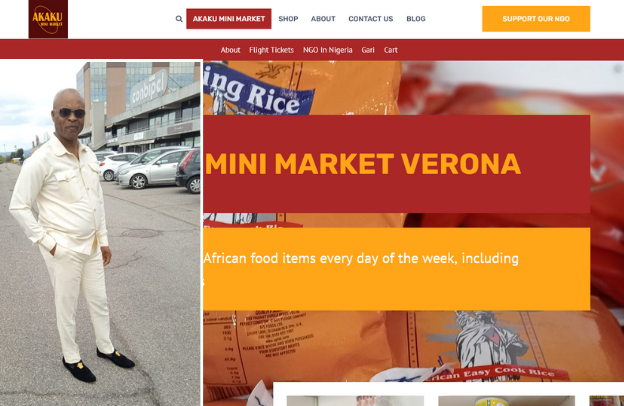Finding Home Through Entrepreneurship: The Journey of Ezekiel Geofrey Uzo and the Power of African Diaspora Collaboration

My yesterday interview with a Nigerian shop in Verona. When you first meet Ezekiel Geofrey Uzo, standing at the entrance of Akaku Mini Market in Verona, Italy, it’s hard not to be struck by his quiet confidence. His shop, tucked away in the neighborhood of Porto San Pancrazio, hums with life. The shelves are stacked with African staples, garri, egusi, okra, and ogbono, all representing a tangible connection to home for the many Nigerians and Africans who live in the city of Verona. But Uzo’s story is more than just a business success. It is the story of resilience, of a journey that began decades ago in Eastern Nigeria and continues to thrive in the heart of Italy.
Want to learn more about storytelling? Start by downloading the first chapter of The Storytelling Mastery.
This story is not unique to Uzo alone. Across Europe and beyond, members of the African diaspora are finding new ways to bridge the gap between where they came from and where they are now.
Entrepreneurship, for many like Uzo, has been the key to survival, growth, and community building. And if you are part of this vibrant global community, there’s an important lesson to learn: through collaboration, education, and mutual support, the African diaspora can elevate itself collectively, turning individual struggles into shared success.
This article series is part of an ongoing research project exploring the presence of Africans in northern Italy. What started in 2013 as a small initiative in Verona has since grown into a dynamic platform, bridging the experiences and stories of the expansive African diaspora.
Today, this initiative continues to grow through weekly LinkedIn audio live events, where we explore the art of storytelling—a theme central to my 2023 five-part book series, The Storytelling Mastery. This series emerged directly from the insights gathered during the research, building on two earlier works, The Journey: Africans in Verona and The Color of Our Children.
A Journey Across Continents
Uzo’s journey began in Imo State, eastern Nigeria, where he grew up in a family deeply rooted in business. His father, a trader, instilled in him the values of entrepreneurship from an early age.
After secondary school, instead of pursuing further education, Uzo joined his father in the family’s shop. “In Igboland, entrepreneurship is part of our culture,” Uzo explains. “We have the Igbo Apprentice System, where young people work for family members or mentors and eventually become their own bosses after learning the trade.”
Uzo’s decision to leave Nigeria in 1989 was fueled by a desire for a better life, one where he could make enough money to return home and continue trading. Like many others from Africa at the time, Europe represented an opportunity to earn, learn, and eventually give back to the community that raised him.
But Uzo’s story took a different path. As the years passed, returning to Nigeria became less feasible. “The Nigerian government has had many challenges, and the business environment didn’t improve the way I had hoped,” he says.
So, Uzo stayed back in Europe, a story that is quite common among many Nigerians and Africans in the diaspora. Now he has built his life in Europe, first in Germany, then in Italy—working hard, adapting, and eventually establishing his Mini Market in Verona.
The Power of Perseverance in Entrepreneurship
Starting Akaku Mini Market in December 2020, right in the middle of the pandemic, was a leap of faith for Uzo. “We began with just a few products,” he recalls. “I was unsure if the business would take off. Fast forward to today, and we’re thriving, thanks to God’s grace and my dedication.”
What has driven Uzo’s success is a simple but powerful belief in the value of perseverance. “I’ve always believed in turning €20 into €30 and €30 into €50,” he explains with a deep sense of satisfaction in his face.
This mindset is not unfamiliar to African entrepreneurs in the diaspora, many of whom have had to start with little and build something from the ground up.
It wasn’t easy. Uzo recounts how, in the early days, he would open his shop even on Christmas and New Year’s Day. “People joked that Igbo people love money so much they even work on December 31st,” he says with a laugh. But for Uzo, it wasn’t just about making money, it was about survival. “I felt that if I hadn’t been open during those odd hours, I might not be here today.”
See also Building a Legacy – How African Diaspora Entrepreneurs are Making Their Mark
Uzo’s story reflects the entrepreneurial spirit of many Africans in the diaspora. According to the World Economic Forum, Africans living abroad send over $800 billion in remittances back to their home countries in 2022 alone.
Many of these funds come from businesses established by immigrants like Uzo, who work tirelessly to not only support their families but also invest in their communities, both in their new countries and back home.
Building a Community Through Business
One of the most striking aspects of Uzo’s mini market is the sense of community it fosters. His store doesn’t just serve as a place for Nigerians and other Africans in Verona to buy familiar foods.
It’s also a cultural hub, a space where people come together, exchange stories, and maintain a connection to their roots. “I can say we have a supportive community,” Uzo says. “People will even call me late at night asking for something—just like we would do back in Nigeria.”
This sense of belonging is essential for many African immigrants who often face feelings of isolation and homesickness. In cities across Europe, ethnic shops like Uzo’s are more than just businesses—they are lifelines to culture and home.
But the success of such businesses doesn’t happen in isolation. It is built on collaboration—within the diaspora and across borders. In fact, collaboration within the African diaspora is one of the key drivers of success for African-owned businesses. We promote this a lot on AClasses Academy, especially through our Creative Studio where we help businesses to establish themselves and remain online by owning their story.
According to the African Development Bank, collaboration and networking among African diaspora entrepreneurs have led to the establishment of more resilient businesses, better job creation, and increased innovation in industries ranging from food services to tech.
You might also like The Rise of Social Entrepreneurship in the African Diaspora: How Small Businesses are Making a Difference
In case you are wondering, here are three types of effective collaboration among African diaspora entrepreneurs:
Mentorship and Knowledge Sharing:
Experienced entrepreneurs within the diaspora can mentor and guide emerging entrepreneurs by sharing their expertise, resources, and networks.
This collaborative approach helps newer entrepreneurs avoid common pitfalls and accelerates their learning and growth, fostering a sense of community and continuity within the diaspora.
Joint Ventures and Partnerships:
Diaspora entrepreneurs can collaborate by forming joint ventures or partnerships, and pooling their resources, skills, and market access.
These partnerships can leverage diverse expertise, enabling businesses to tackle larger projects, enter new markets, or create more innovative products and services.
Diaspora Investment and Funding Networks:
Entrepreneurs within the diaspora can create or join investment groups, crowdfunding platforms, or angel investment networks focused on supporting African-owned businesses.
These collaborative funding initiatives provide much-needed capital for startups and growth-stage businesses while allowing members of the diaspora to invest in and support their community’s economic development.
The Challenges of Running a Business as a Foreigner
Despite the sense of community and success, running a business as a foreigner in Europe isn’t without its challenges. Uzo mentions the heavy tax burdens as one of the main obstacles.
“There’s little support for foreigners starting their own businesses,” he explains. “No matter how small your operation is, you’re taxed almost the same as larger stores, which can feel discouraging, especially as a non-citizen.”
This experience is echoed by many other African entrepreneurs across Europe. The European Union’s 2019 report on migrant entrepreneurship highlights how non-EU entrepreneurs often face significant barriers to entry into the business world, including limited access to finance, complex regulatory environments, and discrimination.
Yet, despite these challenges, Africans in the diaspora continue to thrive in the entrepreneurial space.
Collaboration as a Path to Collective Growth
If you are an entrepreneur in the African diaspora, one of the most important takeaways from Uzo’s journey is the power of collaboration. His success, like many others, was not built in isolation. It came from years of learning, adapting, and connecting with others in his community.
The global African diaspora is a vast and growing network. According to the United Nations, there are over 200 million people of African descent living outside the continent, forming a powerful global community with immense economic potential.
By fostering collaborations within this network, whether through partnerships, mentorship, or sharing resources, diaspora entrepreneurs can not only grow their own businesses but also uplift others.
Organizations like the African Diaspora Chamber of Commerce (ADCC) and the African Diaspora Network are already facilitating this kind of collaboration, creating platforms for African entrepreneurs across the globe to connect, share knowledge, and invest in each other’s ventures.
For Uzo, collaboration has been a key aspect of his journey. His store, stocked with products from Nigeria and Asia, relies on strong relationships with suppliers and distributors. And beyond business, Uzo’s shop serves as a space where fellow Africans can come together, exchange ideas, and support each other.
The Importance of Lifelong Learning for Entrepreneurs
Another crucial lesson from Uzo’s journey is the importance of continuous learning. “I believe strongly in the value of business,” he says. For creative entrepreneurs in the African diaspora, education, and self-improvement are key to staying ahead in a competitive global market.
Whether it’s learning new marketing strategies, understanding financial management, or honing your storytelling skills, the ability to adapt and grow is what separates successful businesses from those that stagnate.
This is where platforms like AClasses Academy come into play. By offering business and self-improvement courses tailored to the needs of the African diaspora, AClasses Academy provides entrepreneurs with the tools they need to thrive.
From mastering digital marketing to improving leadership skills, the academy’s focus on practical, actionable education ensures that you can continuously learn and apply new knowledge to your business.
As Uzo’s story demonstrates, being an entrepreneur isn’t just about having a good idea, it’s about having perseverance, adaptability, and willingness to learn that will carry you through the challenges you inevitably face.
Talking of learning, here are three key advantages of lifelong learning for entrepreneurs:
- Adaptability to Market Changes: Lifelong learning helps entrepreneurs stay updated on market trends, technological advancements, and industry shifts. This adaptability is essential for navigating evolving business landscapes and ensuring long-term success.
- Continuous Skill Enhancement: By consistently acquiring new skills and knowledge, entrepreneurs can improve their leadership, financial management, marketing, and operational abilities, making their businesses more efficient and competitive.
- Innovation and Creativity: Lifelong learning encourages entrepreneurs to think creatively and innovate. Exposure to new ideas and perspectives fosters innovation, allowing entrepreneurs to develop unique products, services, and solutions that can differentiate their businesses in the marketplace.
Conclusion on Finding Home Through Entrepreneurship
Always remember this. In the entrepreneurial journey, especially within the African diaspora, the fusion of perseverance, community collaboration, and lifelong learning creates a powerful formula for success.
You might also like Why Hiring African Talent is a Win-Win: Support African Talent, Strengthen Your Business
Entrepreneurs like Ezekiel Geofrey Uzo show that despite the challenges of navigating foreign markets, the drive to succeed transcends borders. By embracing their roots, connecting with fellow diaspora members, and constantly expanding their knowledge, African entrepreneurs can build thriving businesses that uplift both themselves and their communities.
As the world becomes more interconnected, the African diaspora holds immense potential to reshape global markets through collaboration and innovation. Equally important is the commitment to continuous self-improvement, which equips entrepreneurs with the tools to stay agile, creative, and impactful in an ever-changing business landscape.
Want to learn more about storytelling? Start by downloading the first chapter of The Storytelling Mastery.





